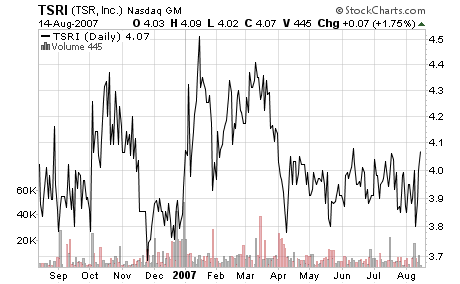There are those that say that microcaps are inherently risky. They are wrong. There are those that say that stocks with low prices (ie, below $5) are inherently risky. They are wrong. There are those that say that OTC BB, pink sheets, or unlisted stocks are inherently risky. They are wrong. (Although, to be fair, most unlisted stocks are not good investments; but that does not mean that being unlisted makes a stock a bad investment.)
For example, I am aware of a couple private companies based near my hometown that I would love to own (if the price were fair), even though they are private (for the record, both are closely held by only a couple people; one of them is Chemtool). As long as I don’t overpay, it doesn’t matter to me if the company is small, the stock is hard to sell, or the financials are not filed with the SEC. As long as I can get my hands on the financial statements and I can trust them, I have no problem owning tiny or illiquid companies. Neither should you.
Perhaps my favorite tiny company that you can buy is TSR, Inc. [[TSRI]], currently trading at just over $4.00. The company sports a book value of $3.05 per share, and most of that is in the form of cash, short-term treasury bills, and short-term receivables. I estimate that the company has a liquidation value of $13 million (compared to a $18.6 million market cap), meaning that in a worst-case scenario we would not expect to lose more than 31% of our investment. The company, currently going through tough times, remains profitable (even excluding interest on its investments). If the company were to utilize its excess cash to fund a special dividend or to buy back stock, while its operations improved modestly to historic norms, the stock could easily increase 50% or more in value. In the meantime, the stock’s nice 8% dividend yield is nice (although keep in mind that the payout yield is over 100%, so some of that dividend currently represents return of capital).
TSR Inc. is a staffing company in New York for computer programmers and related professionals. A large chunk of the company is still owned by its founder, who has also recently bought stock on the open market at around $4 per share. I should note that the founder, Joseph Hughes, has previously been successful when trading TSR’s stock–he sold a large number of shares back in 2004 when TSR’s stock was much higher.
Disclosure: I own TSRI. If you follow my portfolios, you will notice that I sold off a large percentage of the shares I owned a couple weeks ago. This was for strategic reasons (allocating money to a better opportunity). I continue to own what for me is a normal-sized stake in TSRI. See my disclosure policy.

0 thoughts on “Of risk and microcaps: TSR, Inc. (TSRI)”